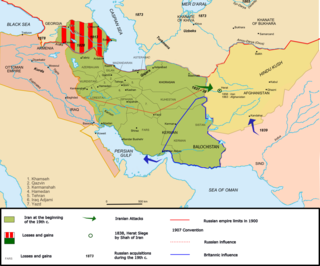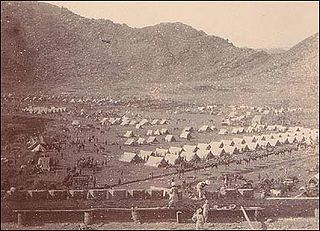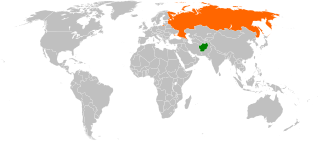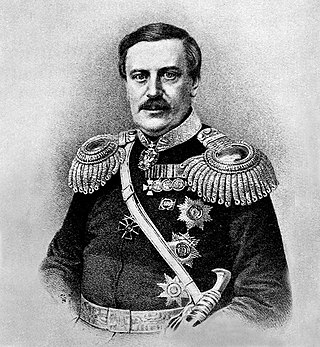
European influence in Afghanistan has been present in the country since the Victorian era, when the competing imperial powers of Britain and Russia contested for control over Afghanistan as part of the Great Game.

Mohammad Najibullah Ahmadzai, commonly known as Dr. Najib, was an Afghan politician who served as the General Secretary of the People's Democratic Party of Afghanistan, the leader of the one-party ruling Republic of Afghanistan from 1986 to 1992 and as well as the President of Afghanistan from 1987 until his resignation in April 1992, shortly after which the mujahideen took over Kabul. After a failed attempt to flee to India, Najibullah remained in Kabul. He lived in the United Nations headquarters until his assassination during the Taliban's capture of Kabul.

The Great Game was a rivalry between the 19th-century British and Russian Empires over influence in Central Asia, primarily in Afghanistan, Persia, and Tibet. The two colonial empires used military interventions and diplomatic negotiations to acquire and redefine territories in Central and South Asia. Russia conquered Turkestan, and Britain expanded and set the borders of British colonial India. By the early 20th century, a line of independent states, tribes, and monarchies from the shore of the Caspian Sea to the Eastern Himalayas were made into protectorates and territories of the two empires.

Captain Sir Alexander Burnes was a Scottish explorer, military officer and diplomat associated with the Great Game. He was nicknamed Bokhara Burnes for his role in establishing contact with and exploring Bukhara. His memoir, Travels into Bokhara, was a bestseller when it was first published in 1835.

The First Anglo-Afghan War was fought between the British Empire and the Emirate of Kabul from 1838 to 1842. The British initially successfully invaded the country taking sides in a succession dispute between emir Dost Mohammad Khan (Barakzai) and former King Shah Shujah (Durrani), whom they reinstalled upon occupying Kabul in August 1839. The main British Indian force occupied Kabul and endured harsh winters. The force and its camp followers were almost completely massacred during the 1842 retreat from Kabul.

The Anglo-Russian Convention of 1907, or Convention between the United Kingdom and Russia relating to Persia, Afghanistan, and Tibet, was signed on August 31, 1907, in Saint Petersburg. It ended the longstanding rivalry in Central Asia and enabled the two countries to outflank the Germans, who were threatening to connect Berlin to Baghdad with a new railroad that could potentially align the Ottoman Empire with Imperial Germany.

Central Asia has long been a geostrategic location because of its proximity to the interests of several great powers and regional powers.

Peter Stuart Hopkirk was a British journalist, author and historian who wrote six books about the British Empire, Russia and Central Asia.
In the late 1990s, some journalists used the expression "New Great Game" to describe what they proposed was a renewed geopolitical interest in Central Asia based on the mineral wealth of the region.

The siege of Malakand was the 26 July – 2 August 1897 siege of the British garrison in the Malakand region of colonial British India's North West Frontier Province. The British faced a force of Pashtun tribesmen whose tribal lands had been bisected by the Durand Line, the 1,519 mile (2,445 km) border between Afghanistan and British India drawn up at the end of the Anglo-Afghan wars to help hold back what the British feared to be the Russian Empire's spread of influence towards the Indian subcontinent.
Reginald Teague-Jones MBE was a British political and intelligence officer. He was active in the Caucasus and Central Asia during the Russian Civil War. For the last 66 years of his life he was known as Ronald Sinclair. Under that assumed name, he authored two published accounts of his travels and adventures in Asia and the Middle East.

The Niedermayer–Hentig Expedition, also known as the Kabul Mission, was a diplomatic mission to Afghanistan sent by the Central Powers in 1915–1916. The purpose was to encourage Afghanistan to declare full independence from the British Empire, enter World War I on the side of the Central Powers, and attack British India. The expedition was part of the Hindu–German Conspiracy, a series of Indo-German efforts to provoke a nationalist revolution in India. Nominally headed by the exiled Indian prince Raja Mahendra Pratap, the expedition was a joint operation of Germany and Turkey and was led by the German Army officers Oskar Niedermayer and Werner Otto von Hentig. Other participants included members of an Indian nationalist organisation called the Berlin Committee, including Maulavi Barkatullah and Chempakaraman Pillai, while the Turks were represented by Kazim Bey, a close confidante of Enver Pasha.

Relations between Afghanistan and Russia first emerged in the 19th century. At the time they were placed in the context of "The Great Game", Russian–British confrontations over Afghanistan from 1840 to 1907. The Soviet Union was the first country to establish diplomatic relations with Afghanistan following the Third Anglo-Afghan War in 1919. On 28 February 1921, Afghanistan and Soviet Russia signed a Friendship Treaty. The Soviet Union intervened in Afghanistan against the Basmachi movement in 1929 and 1930.
A Forward Policy is a set of foreign policy doctrines applicable to territorial ambitions and disputes in which emphasis is placed on securing control of targeted territories by invasion and annexation or by the political creation of compliant buffer states. Such foreign policies have been used by a number of countries including Austria, France, Britain and China, to achieve their tactical aims over external countries. The term has been candidly employed as an unvarnished sobriquet for two military 'forward policies' in two periods of history relating to the Central Asian border disputes in The Great Game,
The Great Game: Afghanistan is a British series of short plays on the history of Afghanistan and foreign intervention there, from the First Anglo-Afghan War to the present day. It is organised into three sets of four plays and draws its name from the 19th and 20th century Great Game, a geopolitical struggle for dominance between The British and Russian Empires. The main plays are linked by monologues and duologues giving historical background and verbatim theatre edited by Richard Norton-Taylor from modern figures linked with western involvement in Afghanistan, such as William Dalrymple, Hillary Clinton, Stanley McChrystal and David Richards.

Arthur Conolly was a British intelligence officer, explorer and writer. He was a captain of the 6th Bengal Light Cavalry in the service of the British East India Company. He participated in many reconnaissance missions into Central Asia and coined the term The Great Game to describe the struggle between the British Empire and the Russian Empire for domination over Central Asia.
Political warfare in British colonial India aided a British minority in maintaining control over large parts of present-day India, Bangladesh, Pakistan and Burma.

Bilateral relations between Afghanistan and the United Kingdom of Great Britain and Northern Ireland span a long and eventful history, dating back to the United Kingdom's Company rule in India, the British-Russian rivalry in Central Asia, and the border between modern Afghanistan and British India. There has been an Afghan embassy in London since 1922 though there was no accredited Afghan ambassador from 1981 to 2001.

The Duhamel plan was a proposed Russian invasion of British-ruled India during the Crimean War, a war in which Russia was fighting Britain, France and the Ottoman Empire. The plan was drawn up by General Alexander Osipovich Duhamel and proposed to Tsar Nicholas I in 1854. Duhamel proposed five alternative routes but his preference was to march through Persia and Afghanistan and invade British India through the Khyber Pass. The plan would have required the support of the Afghans and Persians.

The Khrulev plan was a proposed Russian invasion of British-ruled India during the Crimean War, in which Russia was fighting Britain, France and the Ottoman Empire. The plan was proposed in 1855 by General Stepan Khrulev and would have seen 30,000 Russian troops marching on the North-West Frontier via Persia and Afghanistan. The majority of the men would be recruited from Central Asian tribesmen, with a small reserve of regular Russian troops. The plan was not put into effect before the war ended in Russian defeat in 1856.















